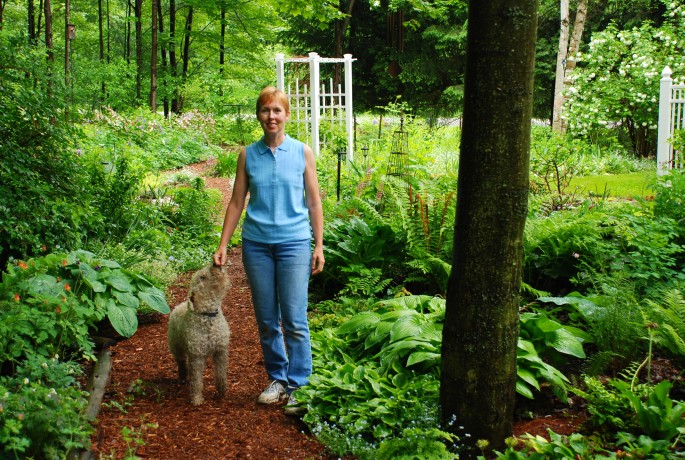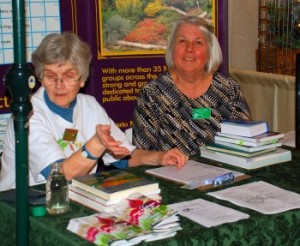Green Thumbs to the Rescue: the Master Gardeners of Ottawa Carleton
If you could ask the Obi Wan Kenobi of gardening about your most frustrating gardening problems, would you? Of course you would! Luckily, we have a whole society of gardening experts who have a mandate to provide helpful advice for the sheer love of gardening. The Master Gardeners of Ottawa Carleton (MGs) help other gardeners though advice clinics, seminars, and booths at events around the area. Best of all, there’s no catch: they’re not selling anything. They just want to share the satisfaction they find in healthy green growing things.
Intrigued by the amazing service they give to the community, I wrote to the Master Gardeners to learn more about them. Coordinator Mary Ann Van Berlo put down her trowel for a while and kindly offered to answer some of my questions about the group.
1. Can you tell me about the history of the Master Gardeners? How long has it been active in the Ottawa area?
Mary Ann: The Master Gardener Program began in Washington State in 1972. Dr. David Gibby, an extension agent for horticulture created the program in response to the overwhelming number of requests for gardening information. Volunteers were trained in horticulture to provide gardening information to the public. Master Gardener programs now operate in forty five states and four provinces in Canada.
In 1985, the Ontario Ministry of Agriculture, Food and Rural Affairs (OMAFRA) reviewed ways to provide horticultural information to the public. One of the ideas presented was the American Master Gardener program. It was investigated and adapted to the Ontario situation and the first pilot sites began in 1985. The program was directed by a Provincial Steering Committee and sponsored by OMAFRA and the Ontario Horticultural Societies. Three pilot sites in Brigden, Englehart, and London began with 39 participants. In 1986, seven new areas, Brantford, Stratford, Ottawa, Windsor, Algoma West, Burlington, and St. Catharines were added bringing 154 new volunteers into the program. Ottawa still has 4 active founding members, each with over 26 years of service to Master Gardeners.
2. What makes the Master Gardeners different from other horticultural societies?
Mary Ann: Master Gardeners are committed to promoting gardening by offering advice to home gardeners. Our mission statement is: to provide unbiased horticultural advice and expertise to encourage better gardening practices for people with gardening needs and interests. Each MG commits to providing 30 hours of volunteer service each year – although many of our members do more. Volunteer service includes staffing advice booths at local farmers’ markets and garden shows, writing articles, lecturing, etc. Horticultural Societies and Garden Clubs also promote horticulture but mainly within their membership and through civic improvement. They are also a learning and social venue. They fill an important role and are considered a ‘partner’ to the Master Gardeners organization. (I personally belong to two local Horticultural Societies).
Master Gardeners also have to meet a certain education standard (courses through either University of Guelph OR the Nova Scotia School of Agriculture OR a Certification Exam) and commit to continued learning.
3. What is it that makes gardening such a worthwhile pursuit?
Mary Ann: For me, gardening is relaxing and yet productive. I can create something beautiful and contribute to the community and the environment in a positive manner by promoting biodiversity, wildlife habitat and curb appeal. Vegetable gardens provide a bountiful harvest of fresh food. Growing both ornamental plants and vegetables is satisfying and worthwhile.
4. Are there any stories you’d like to tell about belonging to the Master Gardeners, like people you’ve helped or any other significant moments?
Mary Ann: I always encourage people to learn to identify the beneficial insects at all stages of their life-cycle. One of my favourite examples is a photo that was sent to our e-mail help-desk with the question “Help, something is attacking my Mock Orange shrub. Can you identify this pest and what should I do?” When I looked at the photo, I could see the shrub had many lady-beetle nymphs on it. I responded that these were not attacking the plant, these are actually beneficial and were probably taking care of an aphid problem. The writer responded that it was too late, she’d already sprayed the plant with Raid to get rid of the bugs – ooops!
Plant or pest identification is one of my favourite challenges – gardeners will often send us a photo of a plant or pest in their garden that they want to identify. Sometimes they’re easy – sometimes we have to forward the photo to our MG colleagues to draw on the pooled expertise of our group.
5. A passion for gardening is clearly at the heart of the hours spent at your volunteer work. Can you tell me some of the other benefits to belonging to the Master Gardeners?
Mary Ann: We do get satisfaction by helping others. It is also a way to share our passion for gardening – sometimes a fellow gardener is the only one who understands our excitement about delivery of a load of compost. And by answering other gardeners questions, it forces us to continue to learn and research garden plants and problems. We certainly don’t profess to know it all and we often learn from each other and our research.
6. Has your group noticed that new gardeners are struggling to get reliable information and help?
Mary Ann: I think that is the void that we fill. We all know you can search the internet for answers, but that they sometimes conflict or are not zone specific or just not reliable. Having someone who gardens in your community and has lots of practical gardening experience, to answer questions is invaluable.
7. What are some of the most common mistakes that beginning gardeners make?
Mary Ann: Planting invasive plants (and then struggling to keep them under control – there’s a reason they are less expensive, they grow/multiply quickly). Planting too closely (this little plant can’t possibly take up that much space). Planting bulbs like tulips or daffodils at the front of the border instead of the back (and then having to wait for the fading foliage to die down).
8. In talking with other gardeners, sometimes the discussion turns to plants that seem to be doing well in Ottawa that could not have survived our winters a few years ago. Has your group noticed a warming trend in the Ottawa area, or do you feel this is unproven?
Mary Ann: I think this is somewhat unproven. Weather is often cyclical and what may survive for a couple of years could still succumb to an extreme winter. Having said that, yes, we are growing things that we didn’t think we could a few years ago.
9. As you know, Ottawa hard been hard hit by the Emerald Ash Borer, and we’re going to lose some of our tree cover. Are there any species or strategies for replacement you would recommend?
Mary Ann: Biodiversity is the only solution I can think of – then if another disease or pest comes along, the entire neighbourhood is not devastated. It is still a loss, but you wouldn’t have complete neighbourhoods starting over such as the Elmvale Acres area which was heavily planted with Ash trees.
10. The drought in Ottawa this year has brought water issues to the forefront. What are some your favourite drought survival strategies for the garden?
Mary Ann: Mulching, improving the soil with organic matter, planting drought tolerant plants and using rain barrels to spot water when necessary (i.e., for new transplants). I don’t water once plants are well established as I want to encourage the roots to go deep to find their own water.
11. What does it take to become an exceptional gardener?
Mary Ann: A true interest in plants. Wanting to understand what makes them tick (so to speak) so that you can provide the best growing environment for them. Also observing them closely to appreciate all their intricacies and ‘behaviour’, which in turn will help you find and diagnose any problems before they become insurmountable.
12. What do you think will become the next gardening trends?
That is hard to predict. I see vegetable production and front yard gardens continuing to grow in popularity. I also think with the recent drought and need to reduce water usage that more drought tolerant gardens and ground covers will replace some lawns.
13. What is the single most important piece of gardening advice you can give?
Mary Ann: Feed the soil. Good healthy soil will mean healthy plants that require less care and will produce an abundance of blooms or produce. The best way to feed the soil is through the addition of a variety of organic matter such as shredded leaves, compost, manure, wood chips, etc.
14. Is there anything else you’d like to say about the Master Gardeners?
Mary Ann: Master Gardeners are available to answer questions by phone (Wednesdays & Thursdays, 1-3 pm. at 613-236-0034) or by e-mail (daily, mgoc_helpline@yahoo.ca). We are also available at various events such as the Ottawa Home and Garden Show each spring, the Byward, Parkdale and Carp markets (Saturdays, May-June) and the Ottawa Farmers Market (Brewer Park, Sundays, July-Sept). We have a garden advice e-newsletter called Trowel Talk which comes out monthly (e-mail trowel_talk_editor@rogers.com to subscribe). And many of our members give presentations, workshops or lectures at venues around town. These are listed in our Trowel Talk e-newsletter.
Visit the Master Gardeners of Ottawa Carleton Website >
by Jennifer Priest
Follow me on Google +



Great article and great answers from Mary Ann! On question #8 (climate change), I would phrase the answer somewhat differently.…